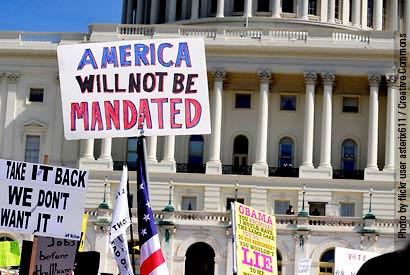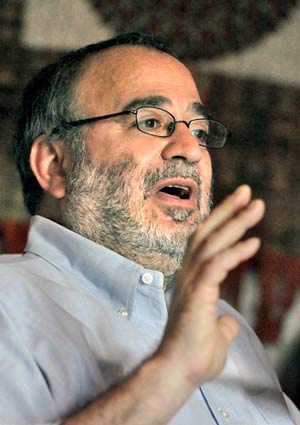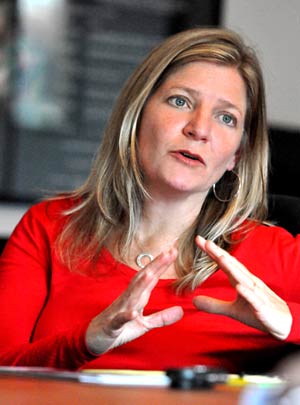Right-wing studies? At Berkeley? Stereotypes aside, fledgling campus center is about scholarship, not partisanship
Neither left nor right, the 2-year-old Center for the Comparative Study of Right-Wing Movements is leading the effort to fill a scholarship gap with roots in the Cold War. Proximity to People's Park has nothing to do with it.

January 18, 2011
October’s campus conference on the Tea Party was scarcely back from its morning break when political reporter David Weigel, waiting his turn on the first of the day’s three scheduled panels, rendered his verdict.
As he blogged in the online magazine Slate — an entry composed, he noted, before the second panelist had finished speaking — “there is something inescapably poetic about a hand-wringing conference on conservative activism held a few steps away from People’s Park.”

Lawrence Rosenthal (Peg Skorpinski photo)
Given the dearth of hand-wringing in evidence, or the actual number of steps from Alumni House to the iconic ’60s battleground, some might call that poetic license. Others would call it simply unfair, a distortion based on a creaky, cartoonish stereotype of a Berkeley campus awash in patchouli and tear gas.
Count the Center for the Comparative Study of Right-Wing Movements, the conference’s chief sponsor, in the latter camp. For the fledgling, explicitly nonpartisan campus center, “inescapable” more aptly describes the easy ironies, knee-jerk assumptions and wishful thinking that have dogged it since March 2009, when the New York Times trumpeted its opening under the headline “New Political Study Center? Turn Right at Berkeley.”
“We’ve become a Rorschach test for a lot of people, in terms of what they think we’re doing,” explains Christine Trost, the center’s program director and the assistant director of its parent, the Institute for the Study of Societal Issues.
And the projections, notes Executive Director Lawrence Rosenthal, have come from both ends of the political spectrum.
On the right, Ward Connerly, the former UC regent and crusader against affirmative action, suggested helpfully that the new entity’s name would profit by changing “right-wing” to “conservative.” Words of encouragement came from Stanford’s Hoover Institution, the Barry Goldwater Center for the Southwest and individuals thrilled by the promise of a full-throated conservative voice on the Berkeley campus.
From the other direction, liberal advocacy groups “saw us as an ally on the left,” says Rosenthal, a self-described “academically improbable character” who earned his doctorate in sociology at Berkeley, was a Fulbright professor at the University of Naples and spent two decades helping to found startups in Silicon Valley.
From the start, though, the mission of the CCSRWM — Rosenthal cheerfully takes responsibility for the center’s cumbersome name and less-than-indelible acronym — has been to foster scholarship, not partisanship.
“We’re not a political advocacy organization,” insists Trost, who holds a Berkeley Ph.D. in political science. “We are an academic research center, dedicated to filling an important gap in scholarship and building a new field.”
Closing the scholarship gap
That gap, according to Rosenthal, stems from the Cold War, which for a half-century united the right in a fervent resistance to communism — and led legions of scholars to share in “this kind of monotonous, or unidimensional, notion of the right.”
“Then the Berlin Wall falls,” he goes on, “and you get right-wing movements all over the world, nationalist movements — you get Yugoslavia, you get separatist movements in Italy. You get the Tea Party, but before that you get the rise of militia movements, and so forth and so on. So it’s almost as if the Cold War acted as an ice age. And when the ice melted, all these other things that had been under the ice had new life and popped up. The complexity of the right re-emerged.”
As a result, says Rosenthal, the study of right-wing movements has achieved the status of an “emerging field,” not unlike the rise of ethnic and women’s studies in decades past. And both he and Trost hope to make the CCSRWM a true center for scholars not just here at Berkeley, but throughout the country and the world.
By most standards — Weigel’s, perhaps, excepted — they’re off to an impressive start.

Christine Trost (Peg Skorpinski photo)
Still in its first two years of existence, the center has already pulled off one genuine coup: People for the American Way’s donation of what Trost calls an “astonishing,” 110-box collection of files on right-wing individuals, organizations and periodicals, all of which will eventually be catalogued and made available to scholars through the Bancroft Library.
It has established a graduate training program — meant, Trost says, to “nurture, mentor and train the next generation” of researchers in a burgeoning area of scholarship — as well as a working group for graduate students throughout the Bay Area, and in a variety of disciplines, to share work in progress. (Projects include a comparison of extreme right-wing parties in Eastern and Western Europe, and investigations into the militia, gun-rights and anti-immigration movements.) Mini-grants are available to both grad students and undergrads.
Currently in the works is a resource base of scholars who study the right, beginning with those at the University of California, to help researchers connect with others doing work similar or useful to their own.
And, as befits its historical and international scope, the center has sponsored a dozen colloquiums on topics ranging from the links between creationism and global-warming denial to the civic foundations of European fascism.
The best indicator of the center’s expansive reach, however, might be that cumbersome name.
“We needed the word ‘comparative’ in there, and we needed ‘right-wing,’ and we needed ‘movements,'” laughs Trost. “So what were we going to get rid of?”
‘Death, taxes and the right’
Rosenthal, whose own research has focused on the right in Italy, was a visiting scholar at what’s now the Institute for the Study of Societal Issues when the idea for the center was born. After a Silicon Valley contact told him of a planned donation to Berkeley, recalls Rosenthal — he puts the amount in the neighborhood of $770,000 — “images coalesced” around a longstanding interest: “How,” he wondered, “would one get academic institutions to pay attention to what I regard as a neglected area of study?”
His answer was the Center for the Comparative Study of Right-Wing Movements. In the first blush of Barack Obama’s election, though, many believed the question itself had lost its relevance.
“People were saying, ‘Why bother?’ And the conviction of someone like myself, and I think anyone who has studied the right at all, is that the right is not a passing thing,” he says. “It will take different forms, but it is a certainty — death, taxes and the right. It will be here. And particularly among people on the left, there is a notion that it will go away, it can be defeated and it will go away. And I think that historically that’s nonsense.”
By the time the center opened its doors in 2009, Rosenthal’s conviction seemed confirmed. As he sees it, the emergence of the Tea Party movement is one more step in the rightward shift of conservatism in America that began in earnest with 1980’s so-called “Reagan revolution.”
“What’s clear, in my view anyhow, is that if you think about the generation of the right in power since then — Reagan, Gingrich, DeLay and Bush — the center of power in the Republican Party has become more and more radical over time,” he says. “Instead of trying to turn the clock back to Franklin Roosevelt, they’re now trying to turn it back to McKinley. So I think that represents a significant and qualitative leap in radicalism.”
The Tea Party, he adds, “suggests almost a split into something more radical than we’ve seen before, and significantly more radical than what we’ve got now.”
October’s well-attended Tea Party conference, “Fractures, Alliances and Mobilizations in the Age of Obama,” gathered scholars and journalists from across the political spectrum to share insights and research in progress into the origins, demographics, attitudes and political significance of the loosely organized, hotly debated movement.
Weigel — whose brief stint as the Washington Post’s Tea Party-beat blogger ended last year, prompted by the leak of his snarky listserv observations about “moronic” movement activists and their ideological leaders — appeared on the day’s opening panel, which included Ruth Rosen, now a visiting history professor at Berkeley, and conservative San Francisco Chronicle columnist Debra Saunders. A day later, he reported on the event in a post headlined “Radical Shriek: Lefty academics convene in Berkeley to make sense of the Tea Party movement.”
“It was a shock,” recalls Rosenthal. “It was inconceivable to me that someone could spend the day listening to what was being said and then write a ‘Berkeley is a leftist hotbed’ piece. The disparity between the reality of things and what he reported — that somebody could attend, could participate in the whole thing, and come away saying, ‘Damn'” — he bangs his hand on the table for emphasis — “‘I’m gonna stick with that trope’…”
Rosenthal held his fire for 24 hours, then e-mailed a brief critique of his own to Weigel. “In 30 paragraphs, I count two that seem to refer to actual assertions made in their presentations by panelists…. Is there a less challenging journalistic exercise than to come here and recycle the Berkeley left-elitist cartoon? You report wine and cheese at the Faculty Club but not the steak you had for dinner: it’s not a bad metaphor for the whole of your account.
“You could have written the piece in your sleep,” the e-mail concluded. “Hell, you just might have.”
Such frustrations aside, he and Trost agree that they’ve made headway in establishing the center’s reputation as a place for serious, nonpartisan research on the right. The stale Berkeley stereotypes, they say, crop up far less often than they did two years ago.
More persistent, perhaps, is the hope by some on the left that the right will just go away.
“Even when we were beginning to plan our Tea Party movement conference,” Trost says, “we were faced with questions like, ‘Well, wait a minute, by having a conference on the Tea Party, aren’t you in essence saying that it is a movement, this important thing that needs to be studied, and in that way kind of lifting it up and giving it credibility?'”
“And the answer to that,” says Rosenthal, “is yes.”
For more information— or to view an archived webcast of October’s conference on the Tea Party movement — visit the Center for the Comparative Study of Right-Wing Movements website.